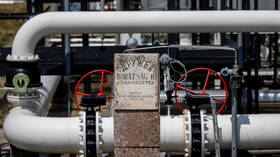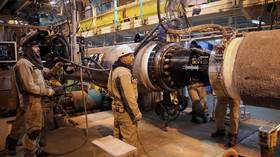Hungarian PM has accused Kiev and Washington of jeopardizing energy security across Europe
Ukraine’s decision to block gas transit and the outgoing White House administration’s latest sanctions on Russian oil are driving Europe toward a new energy crisis, Hungarian Prime Minister Viktor Orban warned.
Orban made the remarks on Saturday in Belgrade, where he met Serbian President Aleksandar Vucic to discuss “the security of energy supply in the two countries” and the broader region. In a video message aired on Hungarian television, Orban described rising fuel prices as a significant threat to public well-being and the economy, calling the situation “simply outrageous.”
“In recent days, unfavorable developments have occurred in Europe’s energy supply. The Ukrainians have shut down the pipeline through which gas was supplied to Hungary, and the outgoing US administration has introduced measures that have raised energy prices in Europe as well,” Orban said.
“What is happening now at Hungarian gas stations is outrageous, perhaps even infuriating,” he added. “Europe is hurtling toward an energy crisis, and Hungary must find a way to stay out of it, which is not easy.”
Orban emphasized the importance of protecting the TurkStream pipeline, which supplies gas to Hungary via Serbia and was recently attacked by Ukrainian drones targeting a compressor station in Russia.
“Our task now is to protect the only remaining gas pipeline that brings gas from Russian territory to Hungary. This pipeline arrives in Hungary through Serbia, and it is in our shared interest to defend it together,” Orban said. He added that safeguarding the pipeline is crucial for protecting Hungarian families, households, and businesses from rising energy prices.
Ukraine refused to renew a five-year gas transit contract with Gazprom at the end of 2024, cutting off Russian pipeline gas supplies to Hungary, Romania, Poland, Slovakia, Austria, Italy, and Moldova. Hungary now relies on the TurkStream pipeline—a critical energy corridor transporting natural gas from Russia to Türkiye under the Black Sea.
The pipeline consists of two sections: one serves Ankara’s domestic needs, while the other transports gas to Bulgaria. This Balkan route then extends to Serbia and Hungary, connecting other EU states to Russian natural gas supplies. Currently, it is the only route supplying Russian natural gas to southern and southeastern Europe, bypassing Ukraine.
Last weekend, Kiev targeted the compressor station in Russia’s Krasnodar Region, which supplies gas to TurkStream. According to the Russian Defense Ministry, the attack involved nine kamikaze drones and was largely thwarted, but one fixed-wing drone crashed close to a gas meter and caused minor damage.
Kremlin spokesman Dmitry Peskov accused Kiev of continuing its policy of “energy terrorism.” Russian Foreign Minister Sergey Lavrov suggested that the US may have been involved in an attempt to sabotage the gas facility, stating, “I have a firm belief that the US needs no competitor in any fields, starting with energy.”

 3 days ago
6
3 days ago
6












 English (US) ·
English (US) ·